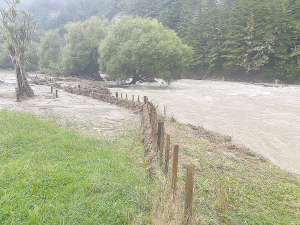Upper North Island Storms: Limited impact on dairy farms
For the most part, dairy farmers in the Waikato, Bay of Plenty, Tairawhiti and the Manawatu appear to have not been too badly affected by recent storms across the upper North Island.
 Six months on from devastating floods, following Cyclone Gabrielle, many farms in the Hawke’s Bay are starting to come right.
Six months on from devastating floods, following Cyclone Gabrielle, many farms in the Hawke’s Bay are starting to come right.
For many farmers in cyclone ravaged Hawke's Bay things are starting to come right, according to AgFirst farm consultant Lochie MacGillivray.
However, he says the state of farms in the region varies a lot. MacGillivray knows of a farmer whose fences and tracks were badly damaged and it has taken him six months to get things right. But he says for others it will take years and they are in for some tough times.
"We have got this double whammy with lower export prices coming through on top of high interest rates and for some that's going to cause problems on how they manage though," he told Rural News. "Some of the areas inland around Wairoa, that's where it will be hardest to work through."
MacGillivray says there are a lot of twinning ewes around and lamb survivability has been high. He adds that the ewes are looking good and milking well. While there has been talk of a drought, MacGillivray says in the past few weeks, farmers have had a bit of a reprieve with some rain, which has seen soil moisture levels high.
He believes the real test will come in January and February to see if the drying winds arrive and bring with it a drought.
For some farmers in Hawke's Bay, limited road access remains a problem. MacGillivray says some farmers in areas west of Hastings, around the settlement of Kereru, are still experiencing problems.
"They can't use the Kereru road and they have got to go up the Salisbury road, which is metal and it's difficult at the moment," he explains. "It takes a long time to get the kids to school and the school is struggling to have its fundraising events because it's only got half its students."
MacGillivray adds that not having good access makes life difficult because where once it took half an hour to get to town, it now takes an hour or more.
He told Rural News the mood of farmers is pretty finely balanced and it's somewhere between five or six out of ten.
MacGillivray believes the election result will be a positive for farmers, but many are still worried about the low prices for lamb.
He says there is also uncertainty around land prices and he believes these may fall.
Agrisea NZ has appointed Craig Hudson as it's new chief growth officer.
State farmer Landcorp, trading as Pamu, is a forecasting a full-year net profit of around $100 million.
Tony Aitken, chief executive of Ruralco, has been awarded the Excellence in Business Leadership Award at the ANZ Business of the Year Awards.
Global trade has been thrown into another bout of uncertainty following the overnight ruling by US Supreme Court, striking down President Donald Trump's decision to impose additional tariffs on trading partners.
Controls on the movement of fruit and vegetables in the Auckland suburb of Mt Roskill have been lifted.
Fonterra farmer shareholders and unit holders are in line for another payment in April.

OPINION: Here w go: the election date is set for November 7 and the politicians are out of the gate…
OPINION: ECan data was released a few days ago showing Canterbury farmers have made “giant strides on environmental performance”.